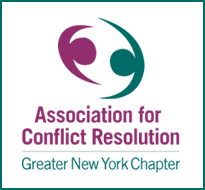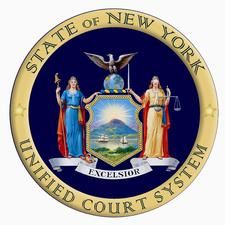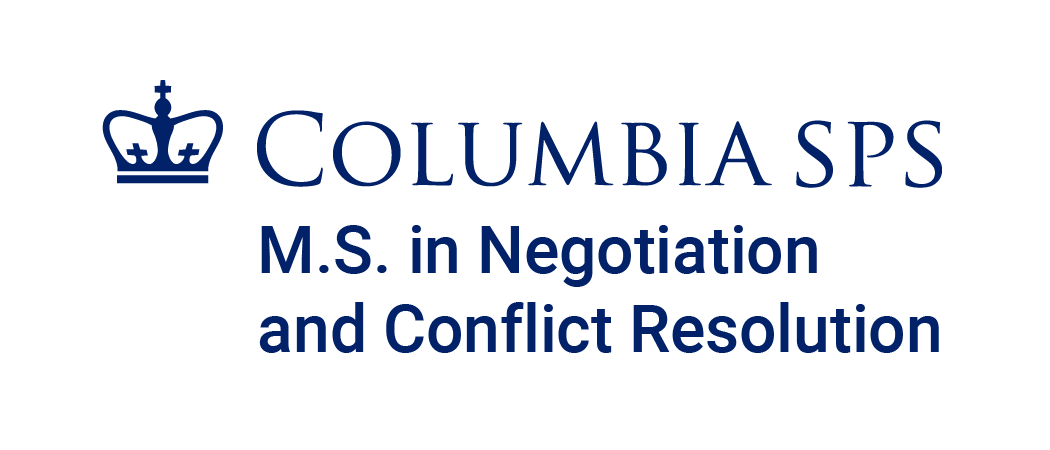|
2019 Conference Agenda (subject to change) Monday, June 3 Kick-Off Program and Cocktail Reception Kick-Off Program and Cocktail Reception to take place at
6:00PM – 7:30PM Panel Discussion Mediating Public Policy Matters:
Panelists:
7:30PM – 9:30PM Cocktail Reception with Hors D’Oeuvres Conference registrants receive complimentary admission to the Kick Off Program & Cocktail Reception. Tuesday, June 4 Full-Day Conference All conference sessions to take place at New York Law School, 185 West Broadway, New York, NY 7:30AM – 8:30AM: Registration and Breakfast 8:30AM – 8:45AM: Welcome Remarks 8:50AM – 10:05AM: Session 1
1C: Accountability in a Restorative Framework Kay Pranis, Circle Keeper and Trainer Description: We will explore, in circle, the meaning of accountability in Restorative Justice philosophy and relate that to our own personal experience. We will then look at how that definition of accountability can be manifested through five distinct elements. We will also examine the conditions necessary to support the kind of accountability sought in a restorative process. This conversation will include consideration of both individual and collective accountability. 10:15AM – 11:15AM: Session 2 2A: Ethics and Neutrality in Mediation Lauren Flicker, JD, MBE, Associate Director, Montefiore Einstein Center for Bioethics Adira Hulkower, Chief, Bioethics Consultation Service at Montefiore Medical Center
2B: Understanding Identity, Privilege, and Power in ADR Practice Alli Finn, Partner & Co-Founder, Seachange Collective Hannah Weitzer, Partner & Co-Founder, Seachange Collective Description: Even as ADR embraces principles of inclusion and self-determination, our practice is still fraught with questions and implications of our various identities, privileges, and power. How can we ensure that good intentions aren’t reinforcing inequalities, injustices, and oppression? How can we identify and name power dynamics, to better promote gender, racial, and economic justice through ADR practice?
2C: The Neuroscience behind Social Pain and Empathy (in Conflict, and its Resolution) Laura Martocci, Consultant, Author
Social Pain—including rejection, exclusion, humiliation—registers in the same pain-centers of the brain as does physical harm to the body. The implications of this are game-changing. They require us to understand that parties in conflict are often limited by the same disruptions to cognitive functioning those who sustain physical injury. In other words, their inability to self-regulate, to problem-solve, or to exhibit compassion for others often has a situationally-based neurological component.
What are the implications of this for mediation and ADR?
To understand, as we must, that all behaviors are purposeful (and to shed light where there is only blame) requires two things: 1) that we have a deeper understanding of the workings of shame, and 2) that we grasp the relation between manifestations of shame and our own capacity for empathy. This workshop will explore how a capacity to empathize is caught up with the potential to engage mirror neurons, and how that potential is readily interrupted by cultural norms that influence how social pain is experienced (and thus, how we respond to, and resolve, conflict). 11:30AM – 12:30PM: Session 3 3A: Careers in Dispute Resolution: Tips, Tools, and Takeaways NY CLE Credit Pending: 1.0 hours - Areas of Professional Practice - Click here for materials Deborah Enix-Ross, Debevoise & Plimpton LLP Matthew E. Draper, Draper & Draper LLC Kenneth Kramer, JAMS Mediator and Arbitrator Dana C. MacGrath, Bentham IMF Rekha Rangachari, Executive Director, New York International Arbitration Center Description: This panel will explore how to build a career in domestic and international dispute resolution, with candid tips, tools, and takeaways, including a discussion on the variety of opportunities available in this growing field. Delegates are invited to come with questions! 3B: Breaking Walls, Making Connections - NICEly Tara Fishler, Director of Learning and Development for Creative Response to Conflict Priscilla Prutzman, Executive Director, Creative Response To Conflict Description: When you stand in a room alone, your voice is the only one to echo. In many classrooms, the echo among varying cultural voices can be loud and divisive. What if our classrooms were respectful enough to engage differing opinions that fostered understanding and support? They have, with the NICE (Nurturing Inclusive Community Environment) program! As a program of CRC (Creative Response to Conflict), NICE began in 2 high schools in Rockland County, New York. Our staff run community building circle activities in classes and support students in managing the conflict in their lives 1:1. In just 2 years, NICE has become part of the fabric of these schools and is about to begin replication. Experience a sample lesson and learn how the NICE program intertwines the 3 prongs of Restorative Practices, Social Emotional Learning and Conflict Resolution for maximum impact! We have expanded to serve the needs of our students after school with our “Girl’s” and “Young Men’s” circles. Our large immigrant population has flocked to our new “Multi-Cultural” club. See how you can replicate the success of our program in your school or youth organization. 3C: Intelligence, Strategy, and Ethics in Conflict Resolution NY CLE Credit Pending: 1.0 hours - Ethics and professionalism - Click here for materials Richard Horowitz, Principal, Richard Horowitz & Associates, Attorneys at Law Description: Conflict resolution is a much needed yet difficult skill to develop, and is a skill that can be applied to interpersonal as well as international relations. Acquiring intelligence about your adversary and developing strategic options based on this intelligence are similarly important yet difficult skills to develop. Along with this, the complexities of competing interests often generate ethical dilemmas that may interfere with or influence decision making. Experience teaches ways of improving the ability to acquire intelligence and to develop strategies accordingly, as well as thinking through how to recognize and handle ethical dilemmas that arise from your planning and decision making. The nature of conflict resolution makes it fraught with these situations and challenges. This presentation explains methods of thinking and techniques that that enables the practitioner to improve their ability to utilize better intelligence and strategy needed for conflict resolution and discusses ethical dilemmas that result from implementing these necessary techniques and how to handle them. 3D: Real Talk: Creating Space to Talk Trauma by and For Teens Ashley Johnson, Youth and Community Advocate - Brownsville Community Justice Center Brownsville Keepers
12:30PM – 2:30PM: ACR-GNY Award Luncheon Keynote Address: Lucas Johnson ADR Achievement Award: Ariel Belen ADR Achievement Award: Kay Pranis |
2:45PM – 4:00PM: Session 4 4A: Is Jay-Z the ADR Diversity Champion We Need? NY CLE Credit Pending: 1.5 hours - Diversity, Inclusion and Elimination of Bias - Click here for materials Chris Kwok, Mediator at JAMS Simon Kyriakides, Senior Counsel at American Arbitration Association Jen Lupo, Managing Member at Lupo Law, Arbitration & Mediation PLLC Eldonie Mason, Founding Member, Attorney & Arbitrator, Mason Firm, LLC F. Peter Phillips, Director, Alternative Dispute Resolution Skills Program Salman Ravala, Commercial Litigator, Arbitrator & Mediator, Professor of Law
4B: Supporting Income-Challenged Families in Mediation NY CLE Credit Pending: 1.5 hours - Professional Skills - Click here for materials Antoinette Delruelle, Mediator and Senior Attorney, New York Legal Assistance Group Jean Norton, Director, Collaborative Family Law Center, New York State Unified Court System Mark Kleiman, Founder, Community Mediation Services Valerie Waldeier, Court Attorney Referee, Kings County Family Court Description: A significant diversity question in the field is around working with individuals and families of different economic backgrounds. If we are to be truly empathetic and impartial neutrals, it is important to be mindful of the economic realities facing many of our clients and seeing past even the most innocent of assumptions we have about people’s financial capabilities. Using case studies from parenting conflicts, this panel will explore the unique challenges of mediating cases with families facing poverty. We will also explore how mediators can manage these challenges to move towards better service to our clients and creating a resolution in a space of increased sensitivity to their lived experience. 4C: Behind Closed Doors: Using Conflict Coaching to fit Criminal Court Needs Tricia Jones, CEO, Conflict Coaching Matters, LLC Anthony Yost, Manager of Mediation & Conflict Coaching, New York Peace Institute Description: The New York Peace Institute has been partnering with the King’s County District Attorney’s Office to adapt the Conflict Coaching Matters conflict coaching model for use in Criminal Court Cases to help those charged with criminal offenses engage in analysis of their conflict behavior and consider alternative courses of action and intervention as well as development of patterns of de-escalatory behavior. This 12-month pilot has proven successful on several levels and this session will explain the development of the partnership, best practices for implementation, the adaptation of the conflict coaching model to fit criminal case needs; and will present preliminary results of research being gathered on efficacy and impact. 4D: Making Noise: Dissonance, Instigation, and Intentional Disruption (An Applied Workshop) Amelia Foster, Interdisciplianry Artist, Amelia Foster Art Jerone Hsu, Apprentice, Prime Produce Apprentice Cooperative Michelle Jackson, Executive Producer, Environmental Projects, Prime Produce Limited Adam Jacobs, Co-Founder at Kids Creative Qinza Najm, Co-op Member, Prime Produce Chelsey Ng, Actor, Sleep No More Description: Participants will engage in a collaborative, creative instigation aimed to push them beyond their comfort zone (and outside their echo chamber). Performance art, intentional disruption, and presence are tools we can employ to explore themes of conflict, dialogue, and difference beyond conventional means of communication. Facilitated by an interdisciplinary team pulling from experiences in creativity facilitation, Sleep No More's immersive theatre and instigation, conflict resolution, community organization, performance art, and participatory art. 4:15PM – 5:30PM: Session 5 5A: Intellectual Property and ADR: Resolving Disputes Away from the Courtroom NY CLE Credit Pending: 1.5 hours - Areas of Professional Practice - Click here for materials Kyle-Beth Hilfer, Esq., Hilfer Law Amy A. Lehman, Esq., Director of MediateArt and Legal Services at Volunteer Lawyers for the Arts David L. Newman, Esq., Chair of the IP Practice at Gould & Ratner Description: A mediator, an arbitrator, and a party advocate walk through a conflict - join us as this diverse panel of ADR professionals explores the options available to parties in an intellectual property conflict. Kyle-Beth Hilfer, Esq. of Hilfer Law, an arbitrator with the American Arbitration Association, moderates a discussion between herself, Amy Lehman, Esq. mediator with the SDNY and Director of MediateArt and Legal Services at Volunteer Lawyers for the Arts, and David Newman, Esq.Chair of the IP Practice at Gould & Ratner. Together, the panel will unpack and analyze a variety of issues that can arise from an intellectual property dispute and explore how ADR options can benefit the unique challenges of these disputes. They will also highlight the differences between mediation and arbitration in an intellectual property dispute. 5B: People with Disabilities: Best Practices for Inclusion in Dispute Resolution Shari Greenleaf, Special Education Mediation Program Coordinator, NYSDRA Amber Kane, Mediation Program Coordinator, Genesee County Family Court Description: How does the existence of a disability affect a party’s ability to access dispute resolution and how might it affect the process? What should dispute resolution practitioners know about this topic? This Workshop seeks to clarify how we as dispute resolution practitioners can develop a greater capacity to be inclusive and ensure that our services can be accessed by all members of our community who seek to resolve conflict. We will review (1) practitioner Codes of Conduct, (2) the capacity of individuals to engage in dispute resolution, (3) creating inclusivity through accommodation, modification and support, and (4) the application of inclusion practices. 5C: Conflict Resolution and the work of Social Healing Eddie Gonzalez, Engagement Manager, Civil Conversations Project Lucas Johnson, Executive Director, Civil Conversations Project The On Being, Civil Conversations Project is focused on the human transformation that makes social transformation possible. Grounded in the virtues and ethos of the On Being Project, this is work of inner engagement and engagement in the world. Deepened inner life creates space for the moral wrestling that can transform interpersonal relationships. The transformation of relationships — changing how we see each other — is necessary if we are to transform our communities and how we live together. Conflict Resolution is essential to the work of social healing. We are working to take a conflict transformation and peacebuilding approach to the scale of change we believe our country needs and desires. The United States is a deeply fractured society. What is the role of conflict resolution/mediation/transformation practitioners in the work of social healing? How can we build a collaborative network that equips and supports communities to wrestle with the important questions of our time? 5:30PM – 7:00PM: Cocktail Hour Reception Register here Questions? Please contact co-chairs Stephanie Crouch and Glen Parker at conference@acrgny.org Thank you to our sponsors:
|








